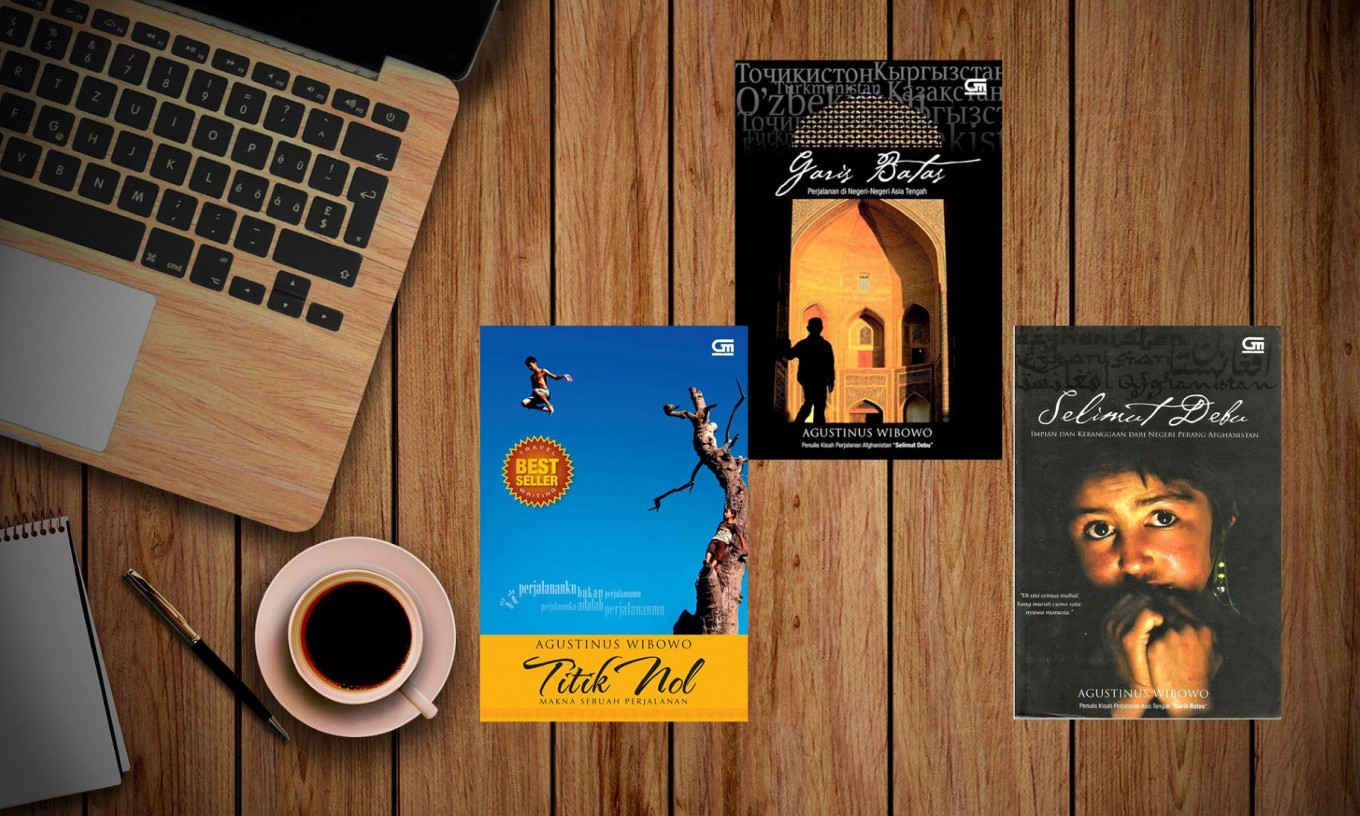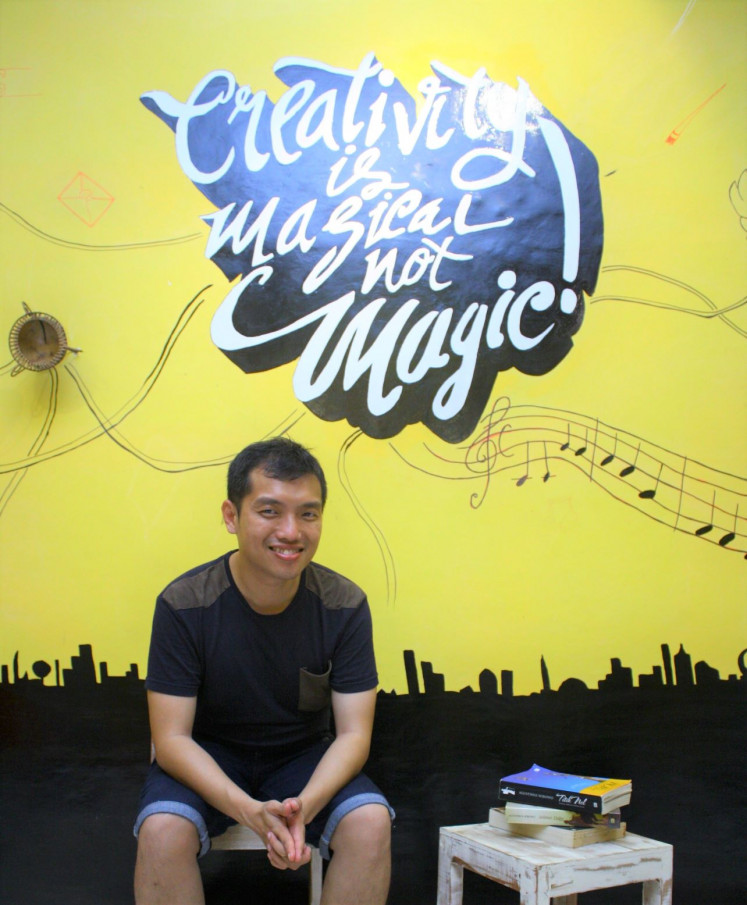Popular Reads
Top Results
Can't find what you're looking for?
View all search resultsPopular Reads
Top Results
Can't find what you're looking for?
View all search resultsAgustinus Wibowo reflects on human nature, cultures
The pandemic has made all but the most essential travel impossible for many aspiring travelers, but it is not author Agustinus Wibowo’s first time at the rodeo.
Change text size
Gift Premium Articles
to Anyone
The restrictions that have come with the COVID-19 pandemic are nothing new for travel writer and blogger Agustinus Wibowo.
In an Instagram live session with nonprofit literary foundation Pulau Imaji, he revealed that back in 2003, he experienced firsthand the lockdown imposed by the Chinese government in Beijing due to the outbreak of SARS.
“I was in university at the time, and all the students were gathered as the lecturers informed us that those who lived outside the campus would not be allowed back in, while those staying inside the campus grounds were not allowed to go outside,” he said, adding that information was much more limited back then, leaving everyone paranoid.
As Agustinus lived outside the university campus, he effectively stopped his studies for two months, as he simply couldn’t get in while classes were still being taught.
“However, those who stayed inside were also stressed, as human nature very much opposes being confined. At the one-month mark, many students became depressed or easily angered; some even scaled the campus wall just to stand outside the grounds,” he said.
When Beijing lifted its lockdown after two months, the first thing Agustinus did was grab his backpack and set out for an adventure.
Taking a 72-hour train ride from Beijing to the border town of Kashgar in Xinjiang, he crossed the Karakoram mountain range into Afghanistan.
Just two years later in 2005, he started what he called a “grand overland journey”, in which he set out to reach South Africa from Beijing by land with a budget of just US$2,000. His travels took him to the Himalayas, South Asia, Afghanistan, Iran and several ex-Soviet Central Asian nations.
After being stranded for three years in Afghanistan, Agustinus wrote his first book Selimut Debu (A Blanket of Dust) in 2010, chronicling his journeys in the country.
Since then, he has actively written on his blog agustinuswibowo.com, with his latest book from 2015 Titik Nol (Ground Zero) receiving a reprint earlier this year.
Nearly two decades later, Agustinus said the current pandemic reminded him of that experience.
“At that time, I felt there’s something characteristic of Chinese culture, namely the concept of walls. Walls are important there, just look at the Great Wall. In China, that culture of walls has been ingrained in everyday life, like how their homes, offices and important institutions are surrounded by walls,” he said.
“The wall separates the inside and outside; there’s even a saying that the two are very different, and the distinction is very strong. Their behaviors around someone from the ‘outside’ versus someone from the ‘inside’ will be markedly different.”
This concept of inside-outside, or nei-wai, is somewhat similar to the general understanding of private-public or internal-external.
As for the lockdowns, Agustinus said the wall was meant to protect those inside from the “outside”, which they denote as dangerous. But at the same time, he added, the wall also allowed rulers to control their subjects by way of clustering different entities into smaller, more manageable ones.
With his experience as a travel writer, Agustinus finds that every culture is influenced not just by tradition, but also religion, political system and history.
“So when China handles the situation through a lockdown, it’s not just because they have the cultural concept of walls, but we also have to look at their political system […],” he said. “This is not something we imagine we can copy, as our systems are different.”
Another key factor to the approach, which is shared by other Asian countries like Japan, Singapore and South Korea, is a background of Confucianism, which he said placed trust in the government as an authority.
This trust, he continued, was what was lacking from European countries and the United States.
“This lockdown system will be especially hard in liberal democracies, which place an emphasis on freedom and individual happiness. And as it turns out, no one is happy being confined. Many will also not care unless it strikes close to home.”
Throughout the pandemic, some have defied the restrictions, organizing so-called “coronavirus parties”, while others have turned to illegal raves to let off their lockdown ennui.
As for a shift in culture and attitude, he also highlighted how changes major world events had influenced our everyday lives today, like how World War I necessitated passports as a valid travel document for security reasons, or how the Sept. 11 attacks led to the bulking up of airport security measures.
“I think COVID-19’s biggest effect will be social distancing, which will change the way we work,” he said.
“Now, it’s a total revolution in the way we work and conduct activities. It’s something that was unthinkable beforehand, like digitalization. Normally we’d be talking in the National Library, but now we’re here digitally.”
International travel has definitely changed in turn, with Agustinus saying that he was unsure the sector would return to normal in the near future.
“Cheap and easy flights will probably take some time to return, not to mention mandatory quarantines that will likely be imposed before COVID-19 has totally disappeared due to fears of foreign diseases,” he said.
Hospitality will also take a backseat due to fears over being infected.
Agustinus reflected on his experiences in Iran and Uzbekistan, where people he met would invite him to stay at their homes. Such a tradition would become a thing of the past in post-COVID times.
“The pandemic will erode that trust as we’ve basically been forced to live in our own worlds. Returning to normal will take some time; it took approximately one year after SARS for life to return to normality, and that’s because there were no new cases at all, whereas some have said that the same can only apply when a vaccine is available.”
With travel around the world effectively grinding to a halt, Agustinus is focusing on his new book titled Kita dan Mereka (Us and Them).
He said the new book would deal with identity and labels, which he observed to be a common issue given occurrences of sectarian violence or other conflicts resulting from identity.
“I’m trying to find out the origins of our identity, like what a nation is and how borders are created as well as its people. Religion will also be discussed, like how religion came to be part of politics and the politicization of religion itself.” (ste)











